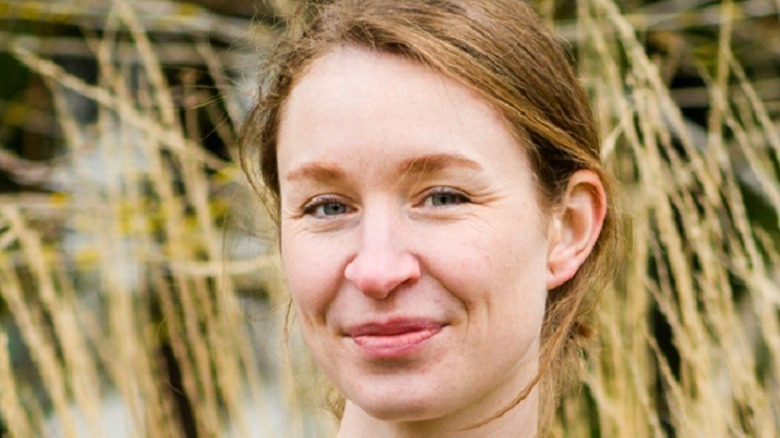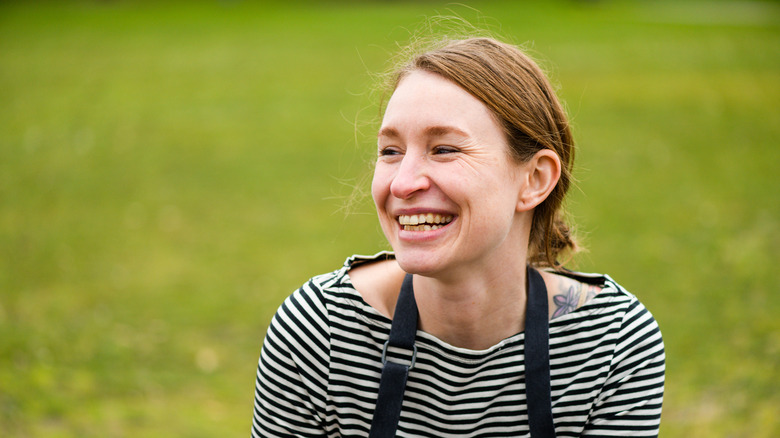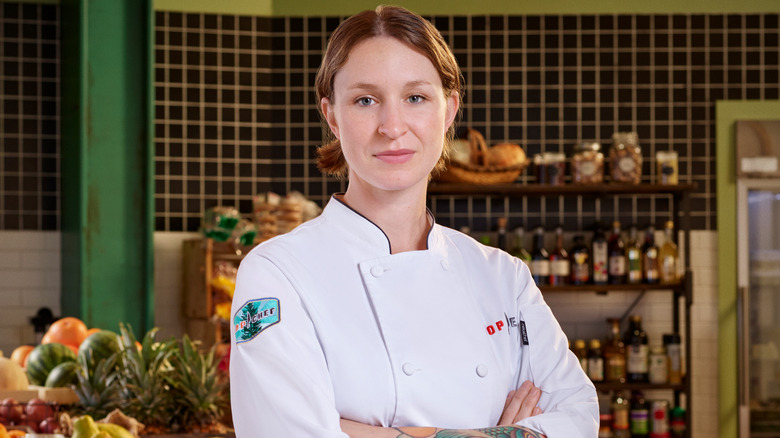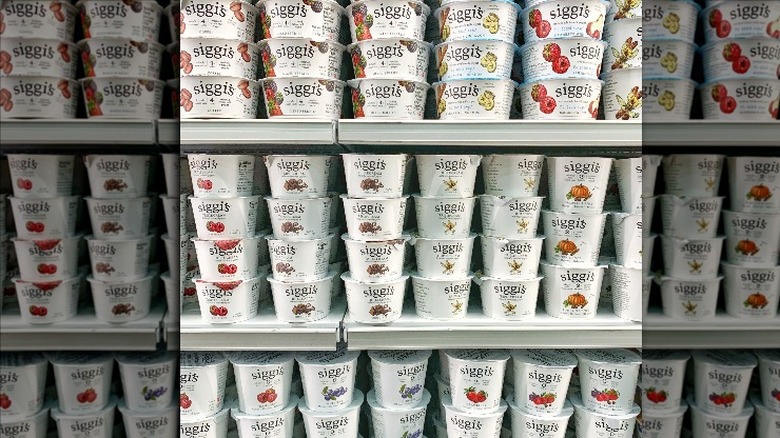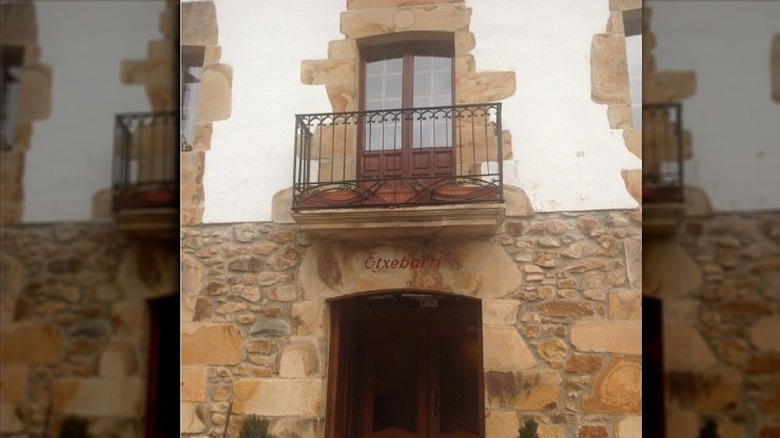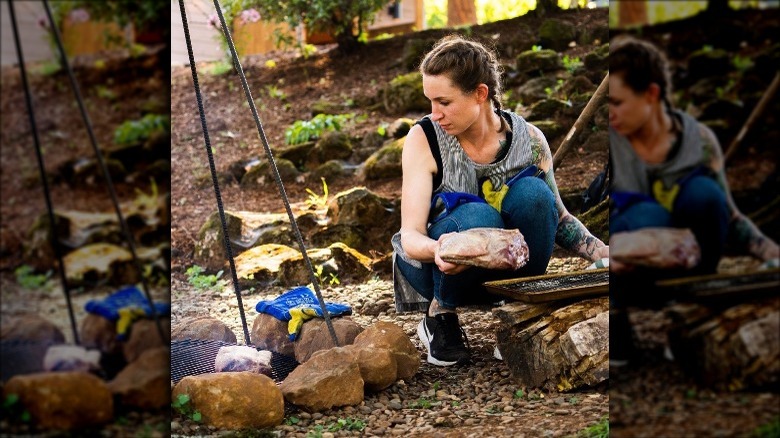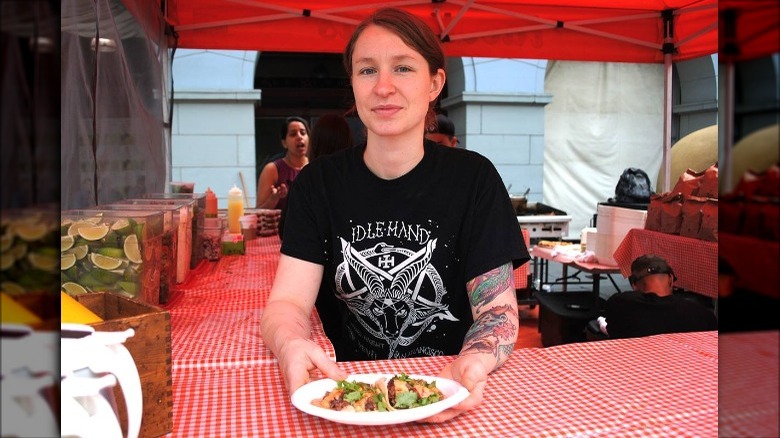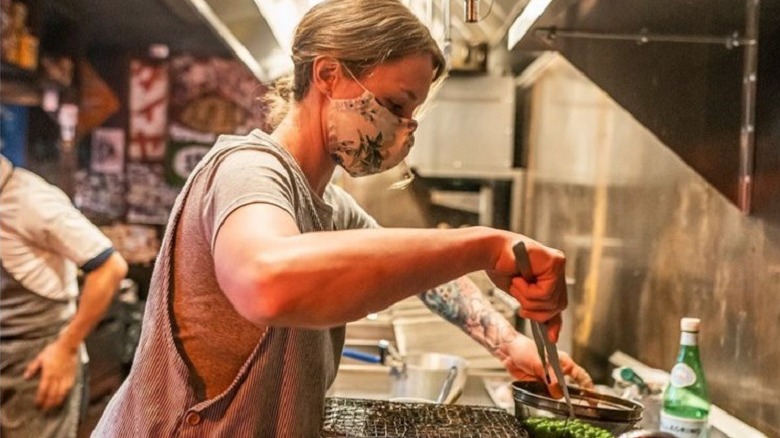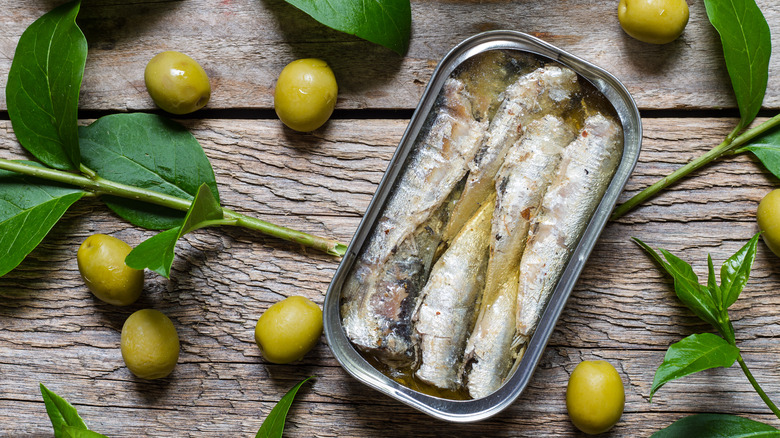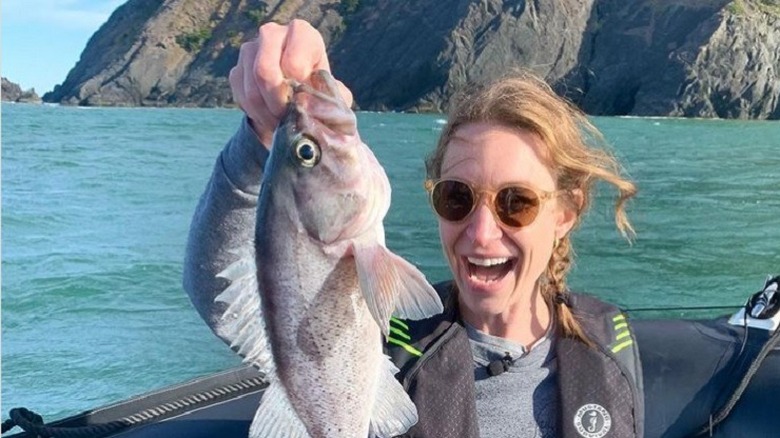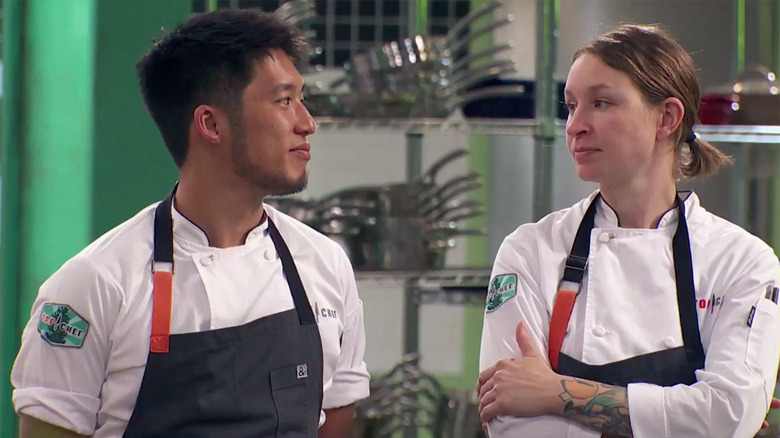Top Chef Season 18 Competitor Sara Hauman Opens Up About Her Experience - Exclusive Interview
Any fan of "Top Chef" knows that the show's ever-popular and always stressful Restaurant Wars challenge has the potential to bring down one of the competition's most talented contestants (hello, or rather, goodbye Kristen Kish and Kevin Gillespie). Such was the unfortunate case for Season 18 standout Sara Hauman who was forced to pack her knives and go when she failed to impress the judges with her halibut crudo.
Despite her way-too-early exit from the show, the immensely talented chef, who honed her skills at Michelin starred eateries Octavia and chef Brandon Jew's Mister Jiu's in San Francisco and Spain's venerated grill destination Asador Etxebarri, had plenty of opportunities to shine on the show. Hauman won the first elimination challenge, along with another victory working alongside eventual Season 18 finalist Shota Nakajima. While she didn't take home the "Top Chef" crown, Hauman did manage to earn the title of "yogurt queen" thanks to her thoughtful (and frequent) use of the creamy and tangy ingredient. And beyond showing off her cooking skills, she endeared herself to fans with her infectious laughter and joyful camaraderie with her fellow contestants.
During an exclusive interview with Mashed, Hauman (accompanied by Stella, an adorable chihuahua and rat terrier mix) reflected on her "Top Chef" experience including her initial reluctance to appear on the show and what went wrong during Restaurant Wars. She also discussed her culinary achievements beyond television from her previous restaurant experiences to her latest endeavor, Tiny Fish, a high-end canned fish line.
Why Sara Hauman initially turned down Top Chef
Your restaurant resume is so impressive. It seemed like an appearance on "Top Chef" was inevitable. How did you end up signing up for the show?
So I was one of those rare cases where they actually had approached me about being on the show, and I'm also one of the rare cases where I turned it down for a few years. And I think timing is so important. And in my life, personally, it's one of those really big things that I pay attention to, and it really wasn't the right time for me. So in 2020, when I got the text from the casting people that they were casting again, and they wanted me to go through the casting process, it seemed like the right time. So I did it.
Since you were already living in Portland, did the Portland setting for Season 18 have anything to do with your decision?
So honestly, we don't know where it's being filmed. That's all a secret. Everything is very, very secretive, so that had absolutely nothing to do with it. I think what had mostly to do with it is the fact that I was working at a job where I felt really comfortable being able to take a couple months away to do the filming. It was the first time in my life that I really had a job that wasn't so demanding. So for me, it seemed like the right moment to take the leap. I think, although I was a little naïve about it, I had no idea how many people actually watch the show and then, yeah, apparently it's a big deal.
Did you talk to any alums before you went on the show to get the lay of the land and learn some tips and tricks?
Nope, I sure didn't. Like I said, I really was flying blind. I did my studying, which was watching the previous seasons, but ultimately I reached out to no one and watching those previous seasons actually got me a little bit more anxious than I think I needed to be. So I had to stop doing that and putting myself through that torture.
Having done some studying, what were some of the aspects of competing that you didn't anticipate?
Honestly, I was so concerned that I was just going to choke right off the bat and the fear of, "Am I going to be able to come up with a dish?" Just in general is really where I started getting a little nervous for my appearance and for the competition. I had never put myself in that stressful environment before where I'm being pushed out of my comfort zone. And honestly, after that first day, and then the second day and the third day of filming, it would just come. It would just come to me, and I had no choice. That was the time limit, I was going to make it happen and that's it. I was going to do it no matter what.
Sara Hauman reveals what it's like to compete on Top Chef
Can you offer some insight into what goes on behind the scenes or aspects of filming the episodes that fans wouldn't necessarily know about?
I think probably there's so many people around all the time. There's constantly people around, not that you can talk to those people all the time. A lot of times you are sitting in silence because they want certain reactions on film and whatnot. So there's a lot of people and there's a lot of quiet time.
You made your presence known out of the gate. You won the first elimination challenge victory and earned another victory with fellow contestant Shota Nakajima in the "Stumptown U.S.A." episode. And then Restaurant Wars came around. Did you have the feeling that things weren't going right from the get-go of that challenge?
I think for that challenge in particular, I definitely had some pretty strong feelings that we were not going in a great direction, and I expressed those feelings, but because of my nervous energy throughout the competition, it was shut down a bit just because it's like, "No, no, no, no, you worry about everything. Stop worrying about this. It's going to be great. We're all adults. We're all professionals. We know how to do this." But ultimately, I think we all on the team realized, "Hey, you know what? There needs to be a leader."
It doesn't matter how professional everyone is. It doesn't matter how much experience we all have; in a situation like that there really needs to be point people for each part of that project. And like I said, I really went for it. There are components of dishes that I had previously made and used recipes for, but ultimately, every single dish that I created is something completely new, I've never done before. And sometimes you win some, sometimes you lose some.
At that point in the competition, was it a relief on some level to get a break from the action, or were you firmly in it to win it?
Nope, I was firmly in it. There was really no taking me out of that competition mode at that point. And I think it gets harder as the competition goes along because for me, my self-confidence continues to be a struggle and a journey up until this moment and it became ever-present. I can do this, I can make it further. I am that person that people are looking to as setting an example of how a certain challenge is supposed to play out, or maybe what direction to go in that challenge. So I was definitely not excited to take any break.
Ultimately, Gabe Erales ended up taking the Season 18 of "Top Chef" title. What are your thoughts on the controversy surrounding that and how that's played out?
Yeah, that's such a bummer. I think, during filming, I was unaware of all of this. I actually am also just the worst. I really don't read a whole lot of publications. I really try to focus on the positive of what's going on in the world and our industry. And I think there's a lot of opinions surrounding it, there's a lot of, "Did other things happen?" Personally, I don't know that side of Gabe, but I think processing that whole situation is still happening for me. And he's been pretty silent since the end of filming, quite honestly.
Sara Hauman discusses her reign as the yogurt queen
You've firmly embraced the "yogurt queen" moniker you earned on "Top Chef." The yogurt section at Whole Foods can be pretty overwhelming, what are your favorite types of yogurts and what are some of the best applications to use yogurt either as the focus of the dish or as a side component?
So I personally like the fuller fat Greek style or skyr. It's creamier. I mean, it's basically putting fat into your food, so it's not only putting fat into your food, it's putting fat and acid at the same time. A lot of times when you add sour cream, for instance, you're making a creamy mushroom "something;" you're going to add a squeeze of lemon or add that sherry vinegar towards the end.
Whereas, if you just add in yogurt at the end — because if you do cook it, it will break — but if you add in that yogurt at the end, you're skipping that step of having to add the lemon because it's got so much tang to it already. Personally, I use yogurt for all things I would use sour cream for including baking. So cakes that call even for milk or buttermilk I'll use yogurt instead, and the recipes will come out just great.
Is there a particular dish that you've recently been working with that has yogurt as a primary component?
Yeah, so personally, my favorite is I made a little video a few weeks back for the 'gram and it's just so simple. It's sesame paste, tahini, yogurt, a little bit of garlic if you want it, a little bit of lemon juice if you want it, and blanched spinach. You mix it up. It's delicious. You can add tofu to it to make it even richer and creamier if you really want, but it's so easy and simple, and it's a great way to eat your greens without feeling like you're being too healthy.
And what's the flavor profile on that?
It's definitely got Mediterranean vibes. You've got that tahini flavor with that acidic yogurt happening, a little lemon zest and garlic, sesame seeds are also great in that.
You mentioned you enjoy Greek yogurt and skyr. Can you talk about the difference between the two and the different ways that you would apply those?
Honestly, I would use them interchangeably. No yogurt left behind. The skyr is sometimes a little bit cheesier, which is really, really lovely. It has a bit more richness to me. I think Siggi's does a really great job and you could get that really, really full, full-fat variety they provide. I think it's like a 19% milk fat variety of skyr or Icelandic-style yogurt. And it's really, really beautiful. But again, would I eat a bowl of it in the morning? Probably not.
How Sara Hauman ended up cooking at one of the world's best restaurants
Let's go back on your timeline a bit. How did you end up in Spain working at Asador Etxebarri and what was that experience like?
So I was feeling a little antsy in life, as I do every year and a half or so. And I had been in San Francisco for about three, four years, and was looking for a little bit of a change. And me just being crazy me, I went onto that San Pellegrino top 50 list and pretty much just emailed every single restaurant that I was interested in working at. My bucket list restaurant was at Etxebarri and they just happened to be the first people who contacted me back. They said, "We'd like you to stay for a whole season." And I said, "Cool. How about, I don't know, a couple months?" And they said, "No, no, no. We would like you for the whole season."
So I went there for the winter to summer season and if I could have worked anywhere abroad, it was probably the best place for me. It is simple and refined cuisine, but it's not fussy by any means. It is very much presenting the food of that particular region, but in just the best way possible. It's not about, does it have a million garnishes? Does it look like you could take this amazing Instagram picture? It's more about, these need to be served at a certain temperature. Like baby eels, for example, is a very seasonal ingredient there. And they're just lightly sautéed with olive oil and garlic, and maybe finished with a little bit of chili flake at the end. But the most important part is that once they're cooked, they need to be consumed immediately. So it's less about that fussiness and more about how do we let the guest experience the best of the ingredients that this area has to offer?
Did you have a particular favorite dish that you would cook there?
So [Etxebarri chef] Victor [Arguinzoniz] is very, very protective of the actual grill, so not a whole lot of people actually cook on the grill. I cooked strawberries on the grill and everyone was like, "Oh my God, you can put stuff on the grill?" I did it very, very cautiously and nervously always. But I think one of my favorite dishes that was always served there is just the simple anchovies on toast. They're beautiful white anchovies that are salt-cured in a barrel for, I don't know, six-plus months, and then they're taken out, soaked overnight.
The next morning, one of those jobs, you get to clean a bunch of anchovies, but the flavor of them is so beautiful. And you can get the salted anchovies from Italy here and you usually chop them up and put them in pasta, but the anchovies there are so large and there's so much flavor in them because they're fermented with all of their guts inside. And they're just served really, really simply on grilled toast and rubbed with a little garlic and tomato.
Why you should be grilling berries and lettuce, according to Sara Hauman
You mentioned strawberries, which most people, probably wouldn't assume to put on the grill. Are there any other items that you work with that you wouldn't necessarily think would go on the grill, but the fire and smoke really elevate them?
Yeah. So I love grilling all sorts of fruit. I call it my party trick when I am doing a private dining that is outdoors. I'll usually make a little foil bowl and then put a bunch of berries in it and just let them simmer and smoke throughout the meal. And then when you eat it on dessert, there's that sweetness but you also get that savoriness from all the smoke that's on there.
Another ingredient I really love grilling is lettuce. I think people don't embrace hot lettuce enough. It's really delicious, especially some nice little gems or baby romaine on the grill is something that's really delightful. Just a touch. You just need a touch — you want to keep that crunchiness. But grilled lettuce is one of my faves.
The important lesson Sara Hauman learned at Etxebarri
You then ended up in San Francisco again and cooked at several notable restaurants there. What brought you back?
So I am originally from the San Diego area and I had a childhood friend who lived in San Francisco and I went up on a whim just because I needed a little change of scenery. And I fell in love with literally everything in San Francisco. The fact that I didn't need a car — for me, that's a big city. I came from a really small town and I was just intoxicated by everything. The produce there is incredibly beautiful.
And every day I felt like, at least for the first year I was working in a restaurant, I discovered a new something, a new piece of produce, a new, I don't know, an animal I had never seen butchered before. That was a huge draw for me, was to push myself, again, out of that comfort zone and not just settling to, well, I can just work in San Diego. This is where I'm from. It was that moment where I really wanted to elevate my career and hopefully work towards something big.
At what point did you really become comfortable with your style of cooking and settle into a specific vision for how you approach food?
Oh, gosh. I think I still am trying to get comfortable. I cook what I want to eat and it's hard for me to explain where I draw inspiration from, but it's also really hard for me to nail down a recipe. That's the worst thing about doing private events, as I work on my own now, is to come up with menus ahead of time because I'm so used to just cooking on the spot. I just want to cook from my heart dinner for you.
So it's really hard for me to think about the conceptualization of a dish as opposed to using what's around me, like produce and what's in season, to inspire that direction of the dish. Working at Etxebarri really, really helped me understand and not be afraid to just put one really delicious thing on a dish and not worry about it and be confident in that because it might be the best shrimp you've ever eaten, it might be the only thing on the plate, but that's okay.
You received a ton of accolades when you took over the kitchen at Huxley. What was your approach there? Did you have full control of that menu?
I did have full control of the menu. I did most of the cooking myself because it was such a small restaurant. And ultimately, that's one of those moments where I think a chef who takes on their first chef job looks back and goes, "Man, I really wish I could go back and do so much differently." I know I got all these accolades, but I wasn't at that confidence point as it was my first chef job. And even though I really didn't have the pressure of training people and the anxiety of managing a whole staff of people — and we're doing 300 covers a night — for me, it was still very nerve-wracking.
And I think it plays into how I feel still when I serve people food. I never really think of cooking as an art, but I think of the psychology of an artist and putting your heart into something and then sharing it and that's a really vulnerable place to be. And I feel very strongly, I'm very in tune with that side of myself. So even today I put out dishes and I'm like, "Ah, do you like it?"
Sara Hauman discusses the difficulties of being a female chef
You followed that up with stints at Octavia and Mister Jiu's which are two fantastic, but very different restaurants. What were those experiences like for you?
So Mister Jiu's was great. Brandon's a great friend of mine. He actually offered me my first job when I moved up to San Francisco. He was the chef at Bar Agricole, so I was with him for a few years. And I think we have the same, I don't know, demeanor in the kitchen. It's not crazy. Yeah, sometimes you get a little heated, but I think ultimately we're definitely the "we just want to chill and cook" type of people. And I was really excited to start working with him in a way where he was making food that was so near and dear to him. I definitely learned so much in the year-ish time that I was there, just about different ingredients that I can use, different ways to maybe add salt to a dish that isn't actually salt, or different ways to add that umami flavor without actually adding MSG, or anchovies, or all the things that I'm used to adding.
Instead, I was like, "Oh, I can use preserved black beans. That's really interesting." And I still really embrace that ideology too, when I'm cooking. It's very simple what I do, but then there's that one ingredient that throws you off and that makes you come back and taste it again and understand like, "Oh, wait, there's something different," not bad, not amazing, maybe, but it's just different. And I think that's where I try to be a little bit creative. It's simple, but there's that one weird thing.
Had you cooked Chinese food before? Did you have any familiarity with the cuisine?
Never cooked Chinese food ever. Never cooked Chinese food, but I definitely was given some tasks where I went home and searched YouTube for hours and hours and watched videos, like turnip cakes or daikon cakes, the dim sum little delicious morsels. That was one of my task projects for that recipe, thank you. And then Octavia, Octavia was very, very different. I started that job, that was the first year that "Top Chef" reached out to me, and I did actually go through the casting process that year. But because [Octavia chef] Melissa [Perello] had offered me that job, I was like, "Uh, TV ... work for Melissa." So I chose to be responsible, at least what I thought was the responsible decision, and I worked with Melissa that year.
She was getting married and wanted a little help running the kitchen. I think our cooking styles are pretty, pretty similar. She's very good at making the plate look really beautiful, I'm less good at plating. But I think to have that mentor as a female owner and chef was something that I needed in my growth as a chef, just to see that it is different for females in the industry. It is very, very different. It is not the same. It will never be the same. We can always hope that it's going to be the same, but life gets in the way. And ultimately, starting a family as a chef is just always going to be much harder as a female. And I think working for Melissa was a reminder of that, but not in a bad way. It was like, you can still do what you want to do, but you know what? We've got to be more badass and we have to work harder.
Why Sara Hauman is obsessed with canned seafood
You are currently in Portland, which also has plenty of terrific food options. How would you compare the culinary scene between San Francisco and Portland?
I really think there's no competition. I think San Francisco has a much more, I don't know, I would say elevated food scene. It's a little bit more grown up, but it doesn't mean that Portland is not scrappy. I do also really think that the gems of food in Portland are oftentimes found at the food carts and that's where you're really going to find a lot of more diverse cuisine. And I think that's where I really, really love the Portland food scene, is the hidden gems.
It's not the most popular restaurant, maybe I've never even heard of it and it's a little hole in the wall. You've got to eat standing up, but those are the places that really stand out. I think San Francisco has less of those places, where you could walk in and get something not great. Whereas, Portland has more of those places where you can walk in and have, "Oh yeah, this is pretty decent."
You're currently working on a line of canned seafood. Was that inspired by your trips to Spain?
Man, I don't know. I would assume Spain has something to do with it. I think I've always been so strangely intrigued with products on the shelves at grocery stores, because ultimately, what's in that can or that jar that was growing in the earth at one point. And to have that transformation of a fish that someone caught with a pole, and now it's on the shelf of a store is a really, really interesting and cool story that I am hoping that I can tell with my tinned fish line.
Sara Hauman previews her canned fish line
What are the biggest misconceptions that people have regarding canned seafood?
I think a lot of it is mass-produced and when it's mass-produced, you're not necessarily thinking about flavor, you're thinking about how can we cost-effectively create a lot of products in a very short amount of time. My products are going to have a bit of a higher price point, but I think my main goal is to have someone open the can and think that maybe that could be served at a restaurant because of the way that canned items have to be processed so that they are safe to consume, you have to cook them at a really high temperature and really high pressure.
So are you ever going to get tuna that's not dry or what we perceive as dry? Probably not, but there is a way to potentially create a sauce within the can that helps with that aspect of dryness that we're tasting. There is a way to use citric acid or vinegar to balance out the salt, because I feel like I have a pretty salty palette as it is, but sometimes I eat tinned fish and it's such a salty salt bomb. So it's practicing the balance that I use in creating a dish and transferring that into a can.
Beyond tuna. What other seafood is going to be part of the line?
So I'm actually not focusing on tuna at all; I don't want to do any tuna. I don't want to do any salmon. We've got plenty of that on the shelves. I don't want to do any oysters. We've also got plenty of that on the shelves. So my first product will most likely be some muscles, doing muscles and a nice Spanish-style sauce. I want to focus on the more sustainable varieties of fish, the lesser-used varieties of fish.
So we're talking rockfish — that's very abundant on the Pacific Coast here — and it's just really not used. You don't see that out on the shelves, but it is still a great source of all the proteins and fatty acids that salmon is and it's just a lot more sustainable. So shellfish is also something that I'm going to be focusing on. The weird stuff. I've got to keep it weird. That's part of my brand, right?
Taking something like muscles, how does the canning process affect the flavor and the texture? And do you envision an eat straight from the can situation or are there other applications you have in mind?
Yeah, so I would love for the focus of my line of tinned fish to be more about eating as is, as opposed to what we usually have, which is cool, you got to pop this can of tuna, then you got to mix in some mayo. Then you got to have this, you got to have that to eat it. I want it to be something that's really easy and delicious. You can eat it over a bowl of rice. You can use a little baguette as a napkin, so you don't get grease all over your shirt. It's great camping food too, which I think is really huge in the Pacific Northwest to be able to just have something that's really easy to grab, does not need refrigeration, a hell of a time for an animal to try to get into.
Why Sara Hauman wants another shot at the Top Chef title
Getting back to "Top Chef" do you anticipate a return to the show? Are you ready to compete again?
I would absolutely compete again. I don't want to say it awoke a beast, but I think that it was this one time in my life whereas adults, you never really ... you push yourself, sure, but it's so hard to push yourself as yourself. When you have someone else pushing you to do something, you oftentimes do these really incredible things. And for me, it was being pushed to the point of not thinking about anything else. Every person, everything dropped off the face of the earth for me. And all I was thinking about in that moment was the task at hand and the challenge and the dish that I was doing and I think that's something that I have been craving ever since. And just that sense of focus and clarity that I got from having nothing else to worry about was very intoxicating for me, kind of like drugs.
With a season under your belt, what would you do differently this time around?
Well, I still got to just be me. I definitely think I would approach team challenges a bit differently, for sure. It's very easy for me to make friends. I don't know. I try to keep it friendly, but I think maybe I'd be a bit better of a competitor. I already made my friends, I'm good. Now I'm just coming back to crush it up a little bit.
As far as making friends, are you still in contact with the other contestants?
Yeah, we talk from time to time. Everyone's back in their lives getting a little bit busy and whatnot. So, it's a little easier to talk to the ones that are closer to me, it's a little harder to stay in touch with the ones on the East Coast, just because of time differences and whatnot. But hopefully, I think I've got a couple of collabs coming up in the next few months that'll bring me on the East Coast, which will be fun.
Anything you want to share?
No details yet. I mean, honestly, the biggest thing in my life is getting my fish company up and going. So hopefully, that will absolutely happen by my goal, which is the holidays, and everyone will have some delicious tinned fish from the Pacific Northwest.
Keep an eye out for Tiny Fish, Sara Hauman's line of canned fish products, and in the meantime, you can keep up with her by following her on Instagram.
